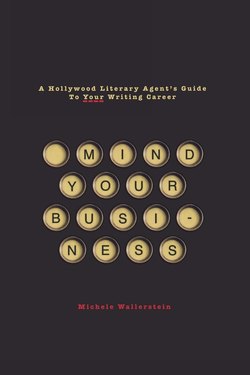Читать книгу Mind Your Business - Michele Wallerstein - Страница 10
На сайте Литреса книга снята с продажи.
ОглавлениеMIND YOUR OWN BUSINESS! 1
I love writers. That's a fact. I always have. I've admired their tenacity, devotion to their craft, their willingness to go that extra mile for little or no reward, their single-mindedness and their wonderfully imaginative minds. I've even loved their sweetness and insecurities as well as – sometimes – their narcissism and their outrageous demands.
As an agent I spent over twenty-five years protecting them, listening to them, reading their work, and strategizing their careers. I negotiated their deals, fought with studio lawyers about their contracts, handled their money, and cared about their lives. Agents do so much more then simply submit scripts to producers.
When I left the agency business and began a new career as a writer's consultant, it hit me like a ton of bricks that new writers as well as pros knew little or nothing of how to maneuver the business of their writing careers. For many years I have been asked questions by professional writers, novices, college students, and even family and friends about the business of writing for the screen. As a writer, you need to understand the behind-the-scenes goings on of your career. You need to understand what is being said as well as what is not being said and what is simply implied in a meeting or on a phone call. You need to know who to talk to and what to say and when to stop talking. You need to know how to read the contract of your script or option deal and how the different points in it will affect you now and even years from now.
Throughout my years in the business I've learned all the “ins and outs” of a writer's business and creative life. As a consultant my work with writers includes helping them get their work into shape so that it is marketable for the Hollywood community. However, I've found that learning to master the creative aspects of writing is not enough to secure success as a writer. This is true whether your medium is motion pictures or television.
Through my tenure as an agent, I was involved in the lives of hundreds of writers, producers, directors, and the occasional actor, and I saw how little they knew about their “business.” Artists may be famous for their craft, may be lauded and given awards, but can still spend years at the mercy of the system that defines them. This is neither a productive nor a safe state of being. The fact that artists often don't understand the business of their creative careers can, and often does, destroy them. As an artist, you can be led to the slaughter by well-meaning but inadequate advisors as well as mean-spirited, selfish egotists who somehow manage to gain your trust. These people are only one small part of the problem. You need to understand just how much you should believe what you read in The Hollywood Reporter and Variety and how to figure out what is really being said. You need to know if you should trust your agent, manager, lawyer, and business manager, as well as which deal is right for you and which one is wrong. The list of questions is infinite.
A writer is really a small business. The creative portion of your career has a world of its own and the business side is like a foreign country.
It has often been difficult and in some cases impossible to teach artists what they need to know to protect themselves, their work, their reputations, and their livelihoods. Most creative folks simply don't want to be bothered with this side of their lives. Watching writers make poor business decisions has brought tears to my eyes, and these bad choices have ruined their careers. Writers have jumped to the wrong agents at the wrong times, trusted their money to poor-advice-givers, gone with the wrong producers who filled their heads with compliments and lies, and not trusted good agents and sat at home with excellent screenplays because they didn't know where to go or what to do with them.
Creative people are surrounded with advisors; however, in reality, you, the artist, are the one truly in charge of your life and career. As Harry Truman said, “The buck stops here.” You are ultimately responsible for the final decisions you make. Make sure that you make them with all the information at your fingertips.
While working as a literary agent I represented writers, directors, and producers in motion pictures, movies for television, television series, and books. During that time I have represented and guided the careers of writers including Larry Hertzog, Christopher Lofton, Peter Bellwood, Ronnie Christensen, Carol Mendelsohn, Randall Wallace, and many, many more. I've watched my clients make wonderful decisions and terrible decisions.
If I can share some knowledge with you now, I will be happy indeed. Someone said that “knowledge is power,” and this still rings true.
EXERCISES
1. Call at least five well-known writers for an interview.
2. Ask what decisions helped their careers.
3. Ask what decisions hurt their careers.
4. Ask about the turning point in their careers.
5. Ask about their best and worst agent experiences.
